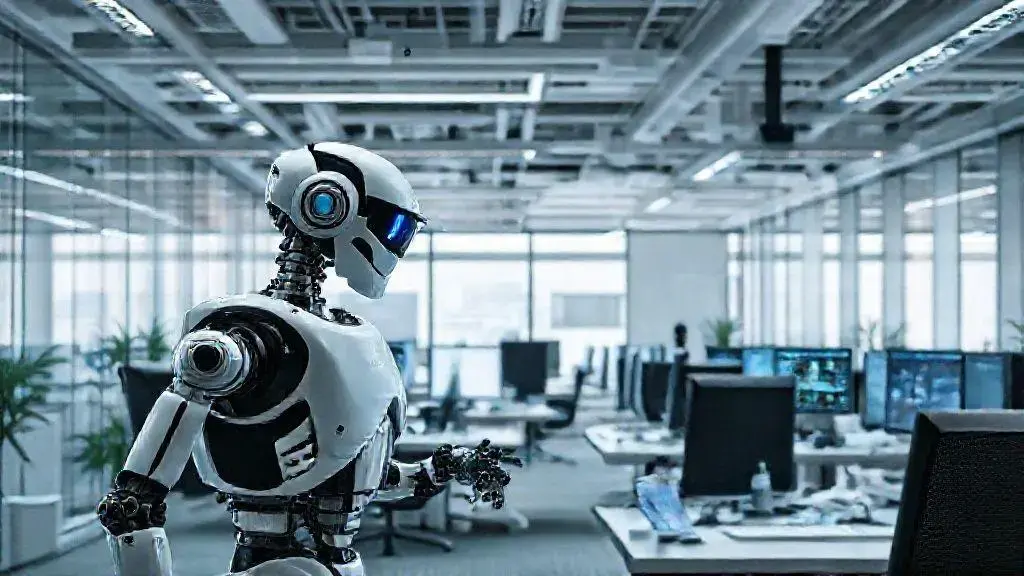Future trends in artificial intelligence you need to know

The future job landscape influenced by AI will see the emergence of new careers in technology while requiring workers to adapt by developing new skills like critical thinking and emotional intelligence.
Future trends in artificial intelligence are set to redefine our lives, influencing everything from business to our daily routines. Have you ever wondered how AI will shape our future? Let’s dive into it!
Impact of AI on various industries
The impact of AI on various industries is profound and far-reaching. It is transforming how businesses operate and interact with customers. From healthcare to finance, every sector is feeling the effects of this technology.
Healthcare Revolutionized
In healthcare, AI is enhancing patient care. By analyzing vast amounts of data, AI systems can identify patterns that help doctors make better diagnoses. For instance, AI can assist in detecting diseases early, leading to higher survival rates.
AI in Finance
The finance industry also benefits significantly. Through machine learning, AI can predict market trends, helping investors make informed decisions. Moreover, AI streamlines operations by automating routine tasks, reducing the risk of human error.
- Fraud detection and prevention.
- Improved customer service through chatbots.
- Algorithmic trading for faster transactions.
Manufacturing is another sector that is being transformed by AI. It enables smart factories where machines communicate with each other. This connectivity improves efficiency and reduces downtime. Companies are using AI to optimize supply chains, resulting in cost savings and better service delivery.
Impact on Retail
In retail, AI enhances the shopping experience. Personalized recommendations based on customer behavior have become standard, making it easier for consumers to find what they want. AI-driven analytics help retailers understand trends and customer preferences.
- Enhanced inventory management.
- Targeted marketing campaigns.
- Virtual fitting rooms for better customer experience.
As we can see, the impact of AI on various industries is undeniable. Each sector is adapting to these changes, leveraging AI to stay competitive and improve service delivery. Understanding these advancements is crucial for businesses aiming to thrive in the digital age.
Emerging technologies in AI

Emerging technologies in AI are rapidly changing the landscape of numerous industries. These technologies are at the forefront of innovation, reshaping how we interact with the digital world.
Natural Language Processing
One significant area is Natural Language Processing (NLP). It allows machines to understand and respond to human language. This capability leads to more intuitive interfaces and enhanced user experiences. For instance, chatbots powered by NLP can provide customer support that feels personal and immediate.
Computer Vision
Another technology gaining traction is Computer Vision. This enables machines to interpret and process visual data from the world. It is used in various applications, from autonomous vehicles recognizing road signs to security systems identifying faces.
- Facial recognition for enhanced security.
- Medical imaging analysis for improved diagnostics.
- Real-time object detection for smart cities.
Machine learning algorithms are also evolving. These algorithms learn from data, improving their accuracy over time. For example, in predictive analytics, businesses can use machine learning to forecast market trends and customer behaviors.
Robotics
The field of robotics is seeing exciting advancements due to AI. Robots can now perform complex tasks with increased autonomy. This progress facilitates automation in sectors like manufacturing, logistics, and even healthcare.
- Automated warehouses for efficient supply chain management.
- Service robots in hospitality and customer service.
- Robotic surgery enhancing precision in medical procedures.
As these emerging technologies in AI continue to develop, they will play a crucial role in shaping our future. By understanding these innovations, businesses and individuals can better prepare for the opportunities and challenges they bring.
Ethical considerations and AI
Ethical considerations and AI are gaining more attention as artificial intelligence continues to evolve. These considerations play a critical role in how technology impacts society and individuals.
Bias in AI Systems
One key issue is bias in AI systems. AI algorithms often learn from data that might reflect societal biases. When this happens, the technology can produce unfair outcomes. For example, facial recognition systems have shown to be less accurate for people of color, raising concerns about discrimination.
- Need for diverse training data.
- Regular audits of AI systems for bias.
- Transparent algorithm development practices.
Another significant concern is the privacy of individuals. As AI systems collect vast amounts of data, there is a risk that personal information may be misused. This leads to questions about consent and security. How can companies ensure that data is handled responsibly?
Accountability in AI
Accountability is crucial in the realm of AI ethics. As machines make decisions, it is essential to determine who is responsible when things go wrong. For instance, in autonomous vehicles, if an accident occurs, who is liable? These questions must be addressed to foster trust in AI technology.
- Establishing clear regulations for AI usage.
- Creating guidelines for ethical AI development.
- Encouraging public discourse on ethical implications.
In addition, there is the challenge of job displacement due to automation. As AI technologies take over routine tasks, many fear that jobs will be lost. This raises ethical questions about how to support individuals affected by these changes. Strategies must be developed to transition workers into new roles.
As we delve into the ethical considerations and AI, recognizing these challenges is vital. Addressing them will ensure that AI benefits society while minimizing risks.
Future job landscape influenced by AI

The future job landscape influenced by AI is changing rapidly. As artificial intelligence becomes more integrated into various industries, new jobs are emerging while others are disappearing.
Emerging Careers
One significant change is the rise of tech-centric roles. As companies adopt AI, there is a growing demand for professionals who can manage and develop these systems. Jobs like data scientists, AI engineers, and machine learning specialists are becoming essential.
- AI ethics compliance officers.
- Data curators for improving training data quality.
- AI trainers to teach machines how to perform tasks.
At the same time, roles such as customer service representatives may evolve. With the rise of chatbots and automated systems, the nature of customer interaction is changing. Employees might need to adjust by taking on more complex problem-solving tasks.
Skills for the Future
Adaptability is crucial as the future job landscape influenced by AI demands new skills. Employees will need to familiarize themselves with AI tools and understand how to work alongside them. Critical thinking and emotional intelligence are skills that will always be in demand.
- Technical skills in programming and data analysis.
- Soft skills for effective teamwork and communication.
- Continuous learning to keep up with advancements.
Moreover, some industries will experience a shift in job functions. For example, in healthcare, the integration of AI can allow medical professionals to focus more on patient care while AI handles administrative tasks. This could lead to improved outcomes and higher job satisfaction.
As we look at the future job landscape influenced by AI, it’s clear that continuous learning and adaptation will be vital. Embracing these changes can lead to exciting new opportunities for workers across all sectors.
FAQ – Frequently Asked Questions about the Future Job Landscape Influenced by AI
What new career opportunities arise due to AI?
AI is creating jobs in fields like data science, machine learning, and AI ethics, which require specialized skills.
How should workers adapt to the changes brought by AI?
Workers should focus on continuous learning and developing tech skills to remain relevant in the AI-driven job market.
Will AI replace human workers?
While AI may change certain job roles, it will also create new opportunities that emphasize human skills and collaboration.
What skills will be important in the AI job market?
Critical thinking, emotional intelligence, and technical skills in data analysis and programming will be essential in the AI job market.





